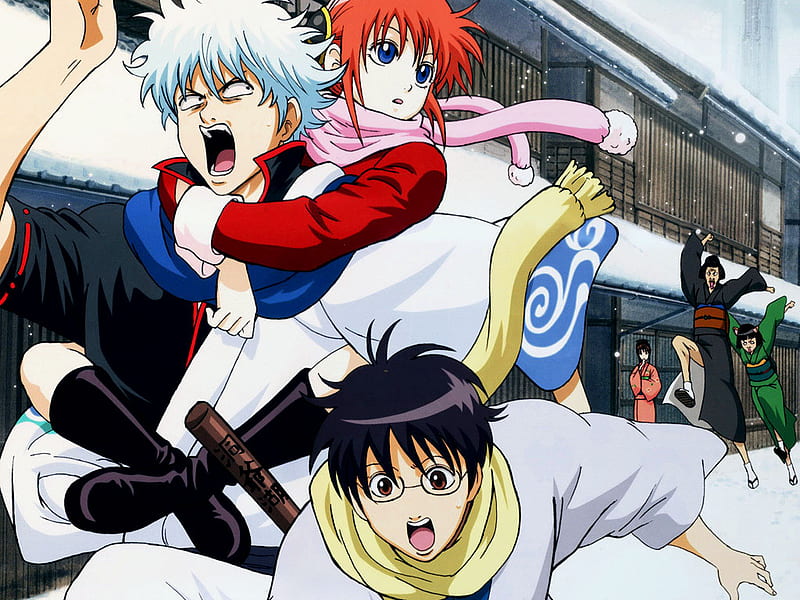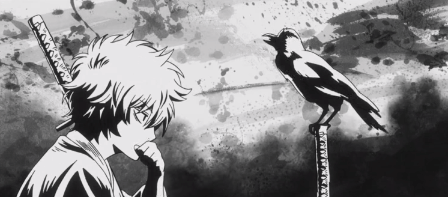Cognitive Evaluation Theory
The Cognitive Evaluation Theory (CET) is a sub-theory of Deci and Ryan’s Self Determination Theory (SDT), which focuses on intrinsic motivation. Specifically, CET looks into the relationship between external events and intrinsic motivation, and identifies autonomy and competence as the two major factors that have a large effect on intrinsic motivation.
Autonomy - the amount of control a person has or believes they have in any given situation.
Sakata Gintoki is an incredibly independent individual, bordering on (and sometimes definitely) selfish. While the people he cares for are closer and more important to him than anything else, he will almost always function completely independently of them in most areas of his life. By doing this, he has inherently set up a boundary in his relationships with others differentiating between the choices he makes because of and for them, and the things they ask him to do.
What this means is that time and time again (particularly in the first half of the show), we see Gintoki reject the requests of those he loves until another factor comes into play/is revealed that increases his own self-interest. Sometimes these factors decrease his autonomy, which forces him to get involved in order to regain control, and sometimes these factors are just more interesting to him than the original request. No matter what the factor is or how it happens, if Gintoki agrees to help one of his loved ones (and they are not paying him), he’s likely doing it because he wants to - not because they asked.
Oftentimes, this is showcased in small, one-off episodes or in recurring comments and bits throughout the series, like when Shinpachi, Kagura, or his landlady Otose asks him for the money he owes them and he refuses because he’s already spent or gambled it away. He clearly experiences no motivation to actually pay them what they’re owed, so he feels no sense of urgency in keeping the money at all.
On a grander scale, this behavior almost translates to the denial of the hero's journey. There are a handful of "serious arcs" in Gintama, and Gintoki initially denies or tries to leave the job at the beginning of almost all of them when realizes what's happening. Not out of fear, but because he's being asked to do something too big and too far removed from himself, so why would he put in that much effort on something he has no stake in?; or because he unveils a larger plot he believes he should remain uninvolved in.
This is where Gintoki's biggest motivators eventually come into play: money, his family (a large list of characters by the end of the show), the Kabukicho District he and family call home, and - by the end of the show - the entirety of Edo is something he’s willing to die to protect.
By this logic, you can almost infer that it’s the lack of choice in getting involved in some of these bigger issues that makes Gintoki reject them at first. And when he sees how he or the people and/or places he swears to protect are affected, his bushido comes into play (a samurai’s code of honor that dictates how they live their lives, what they fight for, who they protect, etc.) and he will stop at nothing to complete whatever his goal is.
In the Farewell, Shinsengumi Arc, Gintoki gets involved in the political fallout of the new Shogun arresting the Captain of the Shinsengumi (Kondo Isao) and disbanding the Shinsengumi entirely even though Gintoki has never helped the Shinsengumi willingly due to a long-running feud and multiple attempts on their end to arrest him. Gintoki decides to get involved because he sees the situation they’re in - specifically the conflict the Shinsengumi Vice-Captain Hijikata Toshiro is in - and recognizes a parallel between Hijikata’s struggle and the most horrific decision Gintoki himself has ever been forced to make. Gintoki, for the first time in the series, offers his aid to Hijikata - to give him more options now where Gintoki himself once had none. But even after Gintoki gets involved, he still makes Kondo promise to pay him for continuing to fight for them at a point where he could have left them to clean up their own mess. When put in a situation where someone is telling him to do something - in this case the Captain of the Shinsengumi - Gintoki is willing to accept their plea for help, but still regains his own autonomy by regaining control and bargaining in the situation.
In the Battle on Rakuyo Arc, Gintoki is explained the entire premise of the issue at hand, how it could lead to the end of Earth entirely, how it all relates to his past, and how his closest enemy and childhood friend is missing, and still decides not to get on their ship because they’re asking him to save a person he doesn’t want to save (Shinpachi and Kagura both want to go, but Gintoki remains stubborn). The only reason he ends up going is because Kagura leaves on her own to join, because her brother and father are involved, and he can’t let her die in space.
When it comes down to it, Gintoki is often put in situations outside of his own control. He exerts his control by denying these requests, by requesting money for them, and by stubbornly choosing to get involved in things so he can have at least a little control over what happens to him and his family.
Competence - the skill or knowledge a person has in a field or subject they are interested in.
Other than being competitive, Gintoki doesn’t demonstrate this factor much. He wants to be better than his rivals (particularly Hijikata and Takasugi), and will take competitions to an extreme to make sure he’s better than them or recognized for being better than them at something.
This includes the time he and Hijikata competed in picking up men during the Dekobokko Arc, and when he and Takasugi would spar and challenge each other in Shoyou’s school as children.
However, Gintoki has been skilled at a young age at sword fighting - one of the only skills he cares about, even a little. He needed to be skilled at it to survive as a small child living on scraps off corpses in abandoned battlefields. Then it became about making his teacher proud.
Unlike most shonen anime main characters, Gintoki isn’t obsessed with strength or being the strongest. He is driven by his bushido, his family, and his community. He’s going to keep fighting because it’s the right thing to do, not because he wants to improve. There’s nothing for him to improve, really. And that’s what makes him so interesting.
͢
Note from me: I'm keenly aware of how much context is relevant for a show with this much content (there are more named significant characters in Gintama than there are nonnamed ones, probably). To counteract this, so I don't feel like I have to explain every single character or event that I reference, I will make another blog post that will serve as a kind of guide that you can reference as you read if needed. I'll update it as things come up, as well.
Hopefully, I'll have that finished before next week!




Wow, really thorough explanations! thank you for your work!!
ReplyDelete